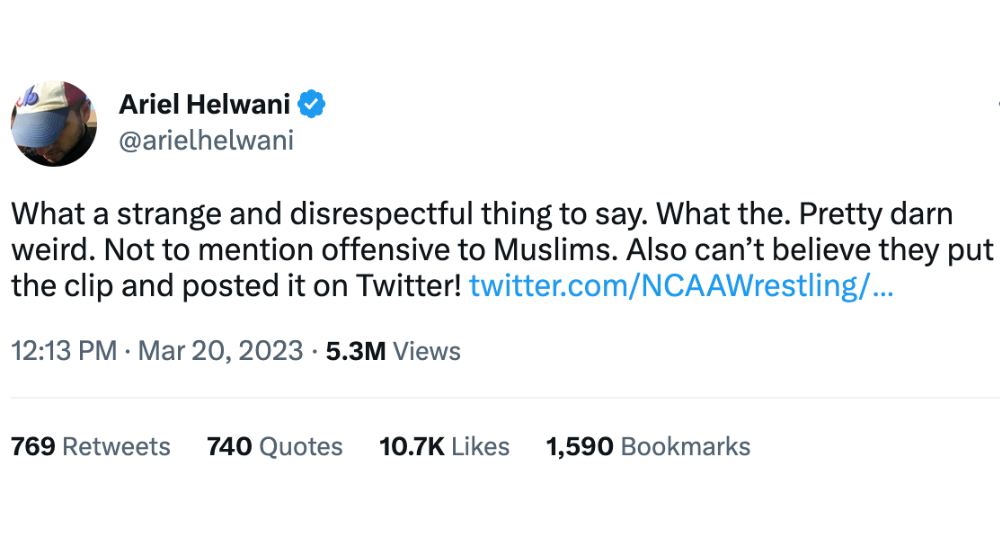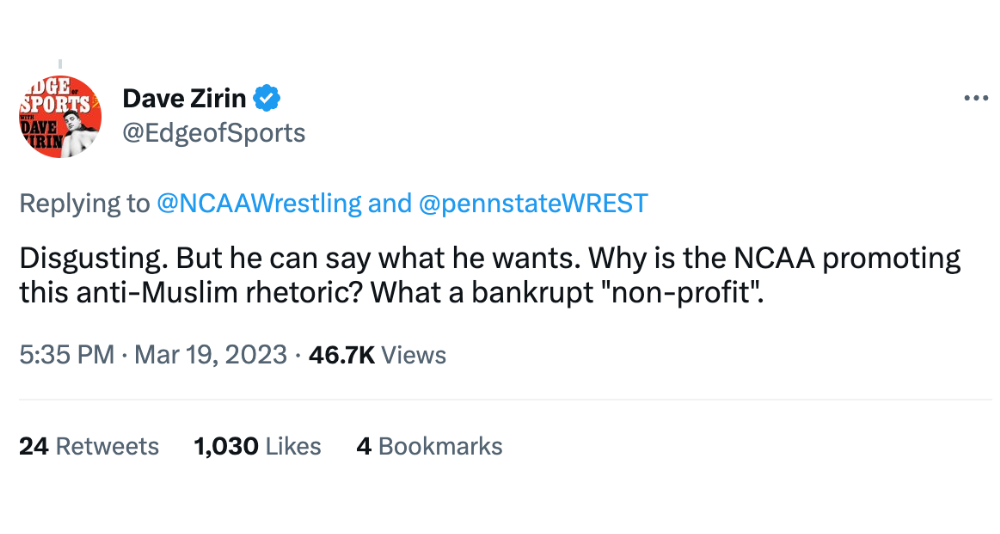
Penn State wrestler Aaron Brooks, who recently won his third consecutive NCAA title in the 184-pound division, found himself at the center of controversy following a profession of faith in post-competition interview with ESPN that drew the ire of UFC analyst Ariel Helwani among others.

During the interview, Brooks was asked, “I know we share a strong faith. How does that help you on a night like tonight?”
He replied, “It’s everything. Christ’s resurrection is everything. Not just His life but His death and resurrection. You can only get that through Him. The Holy Spirit only through Him. No false prophets, no Muhammad, no anyone else. Only Jesus Christ, Himself.”
The ESPN reporter then stated, “Power and finesse. Your calling card.”
Brooks replied, “The Holy Spirit. Acts Chapter 1:8. Power. Holy Spirit. Power. That’s everything. That’s where it’s from.”
He was then asked, “Where’d the finesse come from?” “The Holy Spirit, as well,” he replied.
The interview concluded with Aaron dedicating his performance to God, stating, “I’m blessed. God used me. He gives me this platform for this right here, to exalt Him. That’s all its for. When I’m suffering cutting weight, away from family, it’s all for Him. It’s all for His glory.”

While many athletes openly express their faith, UFC analyst Ariel Helwani took to Twitter to criticize Brooks’ comments. In his tweet, Helwani described Brooks’ remarks as “strange,” “disrespectful,” and “offensive to Muslims,” suggesting that the wrestler had overstepped by sharing his personal beliefs in a public setting.
He tweeted, “What a strange and disrespectful thing to say. What the. Pretty darn weird. Not to mention offensive to Muslims. Also can’t believe they put the clip and posted it on Twitter!”

RELATED: 49ers Brock Purdy Unashamed Of Christian Faith: “God And Jesus Are Going To Be My Identity”
Numerous other Twitter users also expressed their disapproval, posting comments such as “Yuck!” and “Disgusting.”
Dave Zirin, a sports editor at The Nation, went even further by criticizing the NCAA, describing it as a “bankrupt ‘non-profit'” for endorsing “anti-Muslim rhetoric.”
He tweeted, “Disgusting. But he can say what he wants. Why is the NCAA promoting this anti-Muslim rhetoric? What a bankrupt ‘non-profit.'”

As for Helwani’s comments as a UFC analyst he surely knows that many UFC fighters have also professed their faith in God, especially before or after a fight, similar to Brooks.
For instance, leading up to the Khabib/McGregor fight, Khabib openly exclaimed, “Alhamdulillah,” an Arabic phrase meaning “praise be to God,” followed by, “I’m going to smash your boy,” regarding his opponent, McGregor.
RELATED: Tim Tebow: “There Is Only One MVP And He Died On A Cross On A Rescue Mission For Humanity”
Brooks has the same right to express his religious convictions. Besides, discussing one’s faith should not automatically be considered offensive. In doing so, Brooks can express his faith in Jesus and exemplify what he believes to be the most respectful way to carry out his life.
However, critics like Helwani seem struggle to understand the importance of freedom of speech and religious expression.

The controversy surrounding Aaron Brooks’ comments sheds light on a growing issue today: the apparent anti-Christian sentiment that often emerges in public discourse. As society becomes increasingly polarized, it is essential to recognize and address anti-religious bias, including anti-Christianity. Aaron Brooks serves as an example of the unwavering devotion a believer in Christ embodies.
Following the interview, Brooks elaborated on his faith, stating that he’s “defending the gospel.” He also recognized the influential role he could have in the lives of his young fans during the post-match press conference saying, “God has given me this platform, and I have the opportunity to make a positive impact on them.”

In fact, when asked how he stays on top, Brooks responded, “It’s all for the glory of God, you know. Back when I just worshipped wrestling I burned out, but now I’m doing it for Him. I don’t do it to get the trophy and these things. Like I said, it’s to preach to people.”
He continued, “So that’s what motivates me and that’s what’s on my mind the whole time because everything else comes and goes. People are winning and losing, it’s all vanity, you know. Once this is over they’re talking about what’s going on next year. It’s just how the world works. When I’m out there I said, ‘What lives can I change with the Holy Spirit in me because that goes for eternity,” he concluded.
Do you think Helwani’s comments are warranted? Let us know in the comments.
More about:Wrestling





